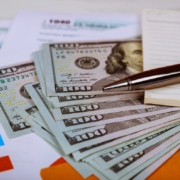How to Protect Yourself Against Coronavirus-Related Scams
- Learn more about economic impact payment scams.
- Find out about two scams that use fraudulent tax returns to target tax refunds.
- Discover how scammers use fake charities and investment opportunities to take advantage of people.
- Learn the steps you can take if you’re the victim of a COVID-19 related scam.
The Internal Revenue Service and other government agencies have noted a rise in scams and other fraudulent activities surrounding the COVID-19 crisis. Individuals and groups, both in the US and in countries across the world, are attempting to take advantage of unwitting taxpayers and business owners.
The global coronavirus pandemic has changed every single facet of our world – from the way we work to how we live our day-to-day lives. We’ve all had to quickly adjust to a new normal.
And unfortunately, there are those out there who seek to take advantage of this trying time.
Fiducial has a list of scams you should beware of as you navigate the current environment.
Economic Impact Payments
While many Americans have already received their economic impact payment (sometimes called stimulus checks), some citizens still await their payments. Stay alert for phone calls, emails, or other methods of communication from those asking for personal information regarding economic impact payments.
Targeting Tax Refunds
Taxpayers have experienced numerous scams and illegal actions which target intercepting a tax refund owed to a taxpayer, or in some cases, fraudulently creating tax returns with a taxpayer’s personal information.
The scams are numerous and come in a variety of forms.
One scheme involves filing a fraudulent tax return on behalf of an unsuspecting taxpayer. When the refund is deposited into the taxpayer’s bank account, the fraudster contacts the taxpayer impersonating an IRS representative.
Then, the fake IRS representative tells the taxpayer that the refund has been deposited in error. The taxpayer is encouraged to purchase gift cards in order to restore the balance to the IRS. When the actual IRS eventually discovers the scam, the taxpayer must repay the funds a second time.
A second scam involves the scammer creating fraudulent tax returns using a taxpayer’s personal information. In this case, the fraudster uses their own deposit information as a way to intercept the refund.
If you expect a tax refund or receive a deposit from the IRS that you do not recognize, reach out to the IRS to confirm your status. You may also ask for instructions on next steps.

Fake charities and investment opportunity scams
Heard about people setting up charities purported to be for the benefit of those impacted by the COVID-19 virus? The IRS also warns of this scam.
In addition, some individuals maintain that they represent companies working on a vaccine to combat the virus. They offer to allow you to invest in their companies. They will tell you you’ll receive a large return on your investment once the vaccine is ready. Don’t fall for this.
What should you do if you’re the victim of COVID-19 related scams?
Think you’ve fallen victim to COVID-19 related scams? File a report with the appropriate government authorities.
The National Center of Disaster Fraud has a complaint form on its website where you can voice your concerns. If you prefer to speak with someone, you can call their hotline number at 866-720-5721.
The Treasury Inspector General for Tax Administration is available to receive complaints related to theft of your economic impact payment.
Finally, if you are the subject of a phishing scam, where fraudsters are trying to get your personal information, you should alert the IRS at their phishing@irs.gov email address.
It is important to stay vigilant against those seeking to steal your hard-earned money or personal information right now.
Have questions about COVID-19 related fraudulent schemes? Call Fiducial at 1-866-FIDUCIAL or make an appointment at one of our office locations. Ready to book an appointment now? Click here. Know someone who might need our services? We love referrals!
For more small business COVID-19 resources, visit Fiducial’s Coronavirus Update Center to find information on SBA loans, tax updates, the Paycheck Protection Program, paid sick and family leave, and more.









